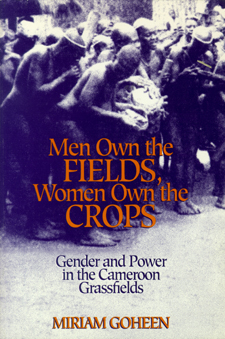African Studies / Anthropology / Gender Studies / Agricultural Economics
|
Men
Own the Fields, Women Own the Crops Based on a decade of fieldwork, this work tracks the negotiations between chiefs and subchiefs and women and men over ritual power, economic power, and administrative power. Though Nso men obviously dominate their society at both the local level and nationally, women have had power of their own by virtue of their status as women. Men may own the land, for example, but women control the crops through their labor. Goheen explains clearly the place of gender in very complex historical processes, such as land tenure systems, title societies, chieftancy, marriage systems, changing ideas of symbolic capital, and internal and external politics. In examining women's resistance to traditional patterns of marriage, Goheen raises the question of whether such actions truly change the balance of power between the sexes, or whether resistance to marriage is instead fostering the formation of a new elite class, since it is only the better-educated women of wealthier families who can change the dynamic of power and labor within the household. The issues
raised in this book are not unique to Nso but apply throughout
the African subcontinent. Written in a straightforward way with
much of the theoretical argument in footnotes, Men Own the
Fields, Women Own the Crops marshals important arguments
of wide relevance in present-day Africa.
Media & bookseller inquiries regarding review copies, events, and interviews can be directed to the publicity department at publicity@uwpress.wisc.edu or (608) 263-0734. (If you want to examine a book for possible course use, please see our Course Books page. If you want to examine a book for possible rights licensing, please see Rights & Permissions.) |

May
1996 The cloth edition, ISBN 0-299-14670-7 is out of print. Add titles to your shopping cart by clicking on the "Add this book to cart" link above. You
can submit your order electronically, paying for it with your credit card. Never
ordered from us before? |
|
|
If you have trouble accessing any page in this web site,
contact our Web manager. Updated June 19, 2009 © 2009, The Board of Regents of the University of Wisconsin System |